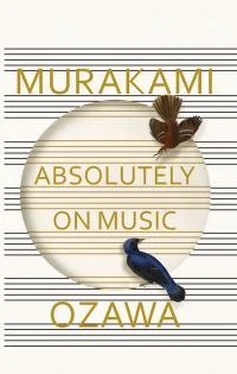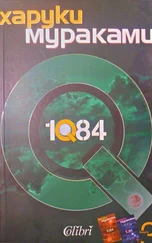MURAKAMI: How about Maestro Karajan?
OZAWA: At first I thought he kept a tight lid on stuff like that. But then, one time, near the end of his career, when he brought the Berlin Philharmonic to Japan, he was putting them through a rehearsal of Mahler’s Ninth, to be performed after they got back to Germany. In other words, this was not a piece the orchestra was to play the next day, so they were not really into it. I was in the hall, listening to the rehearsal, and the musicians were all talking to each other. At one point, the maestro stopped the music to point out something to them, and they just kept on talking. So he turned and yelled to me, “Hey, Seiji, have you ever heard an orchestra make such a racket during rehearsals?” [ He laughs. ] So what was I supposed to say?
MURAKAMI: Maybe he had lost some of his authority by then. I seem to recall there were some problems with the Berlin Philharmonic in those days.
OZAWA: Yes, but they made up in the end, so by then, that was all in the past. But things were pretty bad for a while.
MURAKAMI: When I watched your rehearsals, I often noticed you sort of cueing the orchestra with subtle facial expressions—kind of like, “All right, now I’m going to show you this face.”
OZAWA: Hmm … I wonder … I’m not sure what you mean.
MURAKAMI: You will agree that the Boston’s sound changes a lot with its conductors.
OZAWA: Yes, it does.
MURAKAMI: For a long time the conductor was Charles Munch, then Erich Leinsdorf, and then, I think, it was you, am I right?
OZAWA: After Leinsdorf came William Steinberg.
MURAKAMI: Oh, right.
OZAWA: Maybe three or four years after I stepped in, the sound changed—to the clear, concentrated German style I call “into the strings.” The players put the bow in deep. It makes for a heavier sound. Until then the Boston sound was always light and beautiful. That’s because they used to concentrate on French music. Munch and Pierre Monteux had a major influence. Monteux wasn’t music director by that point, but he was there all the time. And Leinsdorf wasn’t all that German, either.
MURAKAMI: So when your time came, the orchestra changed its sound.
OZAWA: I really wanted to do German music. I wanted to do Brahms and Beethoven and Bruckner and Mahler. So I had them play “into the strings.” The concertmaster resisted, and he ended up quitting. Joseph Silverstein. He was also assistant conductor, and he hated that style of playing. He thought it muddied the sound. He strongly objected, but finally, I was the conductor, so all he could do was resign. He became independent after that and was appointed music director of the Utah Symphony.
MURAKAMI: But you also led the Orchestre National de France for a while. Does that mean you could do both kinds of music?
OZAWA: Not really. I studied with Maestro Karajan, so my music is basically German. I loved Munch, though, after I went to Boston, so I played a lot of French music. I conducted the complete works of both Ravel and Debussy. Recorded them, too. I learned French music after going to Boston. I didn’t learn any of that from Maestro Karajan—oh, maybe Afternoon of a Faun.
MURAKAMI: No kidding? I always thought French music was your first specialty.
OZAWA: No, not at all. Never before Boston. The only thing of Berlioz’s I ever did until then was his Symphonie fantastique. I’m pretty sure that everything else I did of his was at the request of the record company.
MURAKAMI: Isn’t Berlioz difficult? Sometimes when I’m listening to him I can’t tell what’s going on.
OZAWA: Difficult? His music is crazy! Sometimes I don’t know what’s going on, either! Which may be why his music is suited to being performed by an Asian conductor. I can do what I want with it. Once a long time ago I conducted Berlioz’s opera Benvenuto Cellini in Rome. Wow, I just let myself go and did anything I felt like. The audience loved it.
MURAKAMI: There’s no way you can do that with German music, I suppose.
OZAWA: No, no. Oh, and Berlioz has this Requiem … what was it called? … oh, yes, Grande Messe des Morts, the one that uses eight sets of timpani. Talk about taking a free hand with a piece of music! I conducted it first in Boston, then went all over the place with it. When Munch died, I performed it in Salzburg in his honor, conducting the ensemble that he had put together, the Orchestre de Paris.
MURAKAMI: So when you were playing all that French music in Boston, it was not because you chose it, but because the record company requested it?
OZAWA: That’s true. Also, the musicians wanted to play French music. To use it to “sell” the orchestra. So I found myself conducting lots of pieces for the first time in my life.
MURAKAMI: The music you did while you were in Germany, you say, was overwhelmingly German music?
OZAWA: Right. Maestro Karajan did almost nothing else. Well, they did have me doing some Bartók and things, too.
MURAKAMI: But after you took up your post in Boston, you spent a lot of time introducing the “into the strings” technique, creating an environment in which you could perform German music?
OZAWA: Yes. So then a number of German conductors—[Klaus] Tennstedt, Masur—took a real liking to Boston and came as guest conductors almost every year.
Fifty Years Ago,
I Went Crazy Over Mahler
MURAKAMI: When did you start conducting Mahler?
OZAWA: I started liking Mahler under Lenny’s influence. My time as his assistant just happened to coincide with the time he was recording the complete Mahler symphonies. I learned them while I was with him, and after I left for Toronto and San Francisco, I got started trying the complete Mahler right away. Once I settled in Boston, I went through all the symphonies twice. While I was in Toronto and San Francisco, though, Lenny was the only conductor anywhere doing the complete Mahler symphonies.
MURAKAMI: Karajan didn’t do much Mahler, did he?
OZAWA: No, hardly any, for a very long time. Which is why he had me conducting a lot of Mahler while I was in Berlin. I did a lot with the Vienna Philharmonic, too. That way, I concentrated pretty heavily on Mahler at first. The Vienna is visiting Japan now, you know, and if my health weren’t so bad, I was supposed to conduct the Mahler Ninth. That and the Bruckner Ninth.
MURAKAMI: Incredible. That’s heavy lifting!
OZAWA: On this trip, they performed the Bruckner Ninth, but not the Mahler. They’re saving it for when I get better.
MURAKAMI: You’ve got to put all your energy into rehabilitation.
OZAWA: You said it. [ Laughs. ] But anyway, back then I was absolutely crazy about Mahler. That was fifty years ago!
MURAKAMI: With all that behind you, it’s no wonder German music is so central to the Saito Kinen Orchestra.
OZAWA: True. The first time we ever did French music was the Berlioz Fantastique three years ago.
MURAKAMI: They also did that Poulenc opera [ Les Mamelles de Tirésias ].
OZAWA: Oh, right, right! That’s two French pieces. We also did Honegger. He’s Swiss, not French, but his stuff is like French music. Finally, though, Saito Kinen does Brahms best.
MURAKAMI: Yes, they’re very good.
OZAWA: Professor Saito’s teaching had a lot to do with that, and a lot of the people who spent time abroad were in Germany and Austria. The people who got together in Matsumoto to form the Saito Kinen had usually been in Berlin or Vienna or Frankfurt or Cologne or Düsseldorf. Places like that. Some had been to the States, too, come to think of it.
MURAKAMI: The Saito Kinen Orchestra sounds a lot like the Boston Symphony, don’t you think?
Читать дальше











